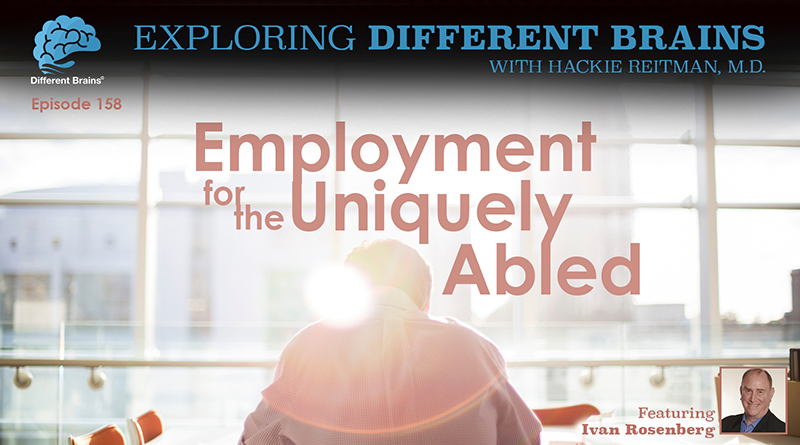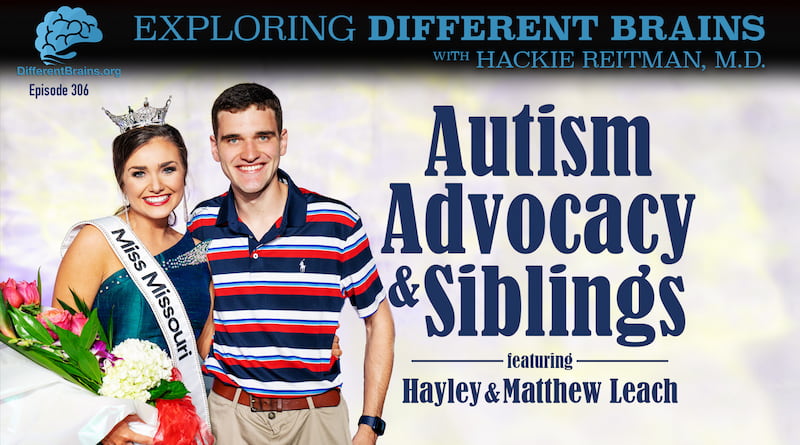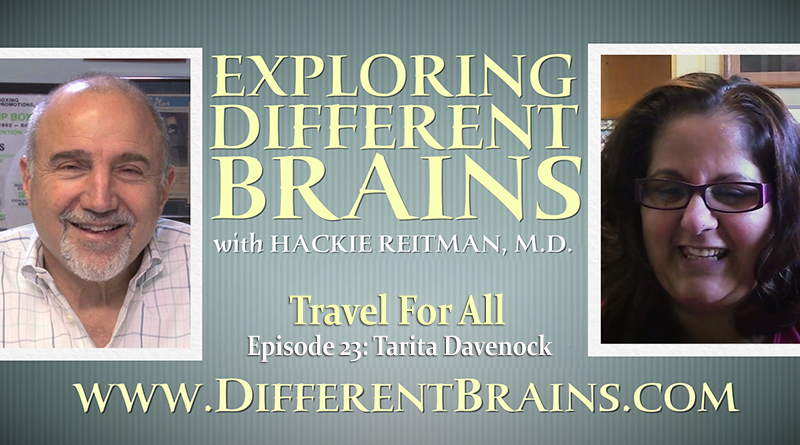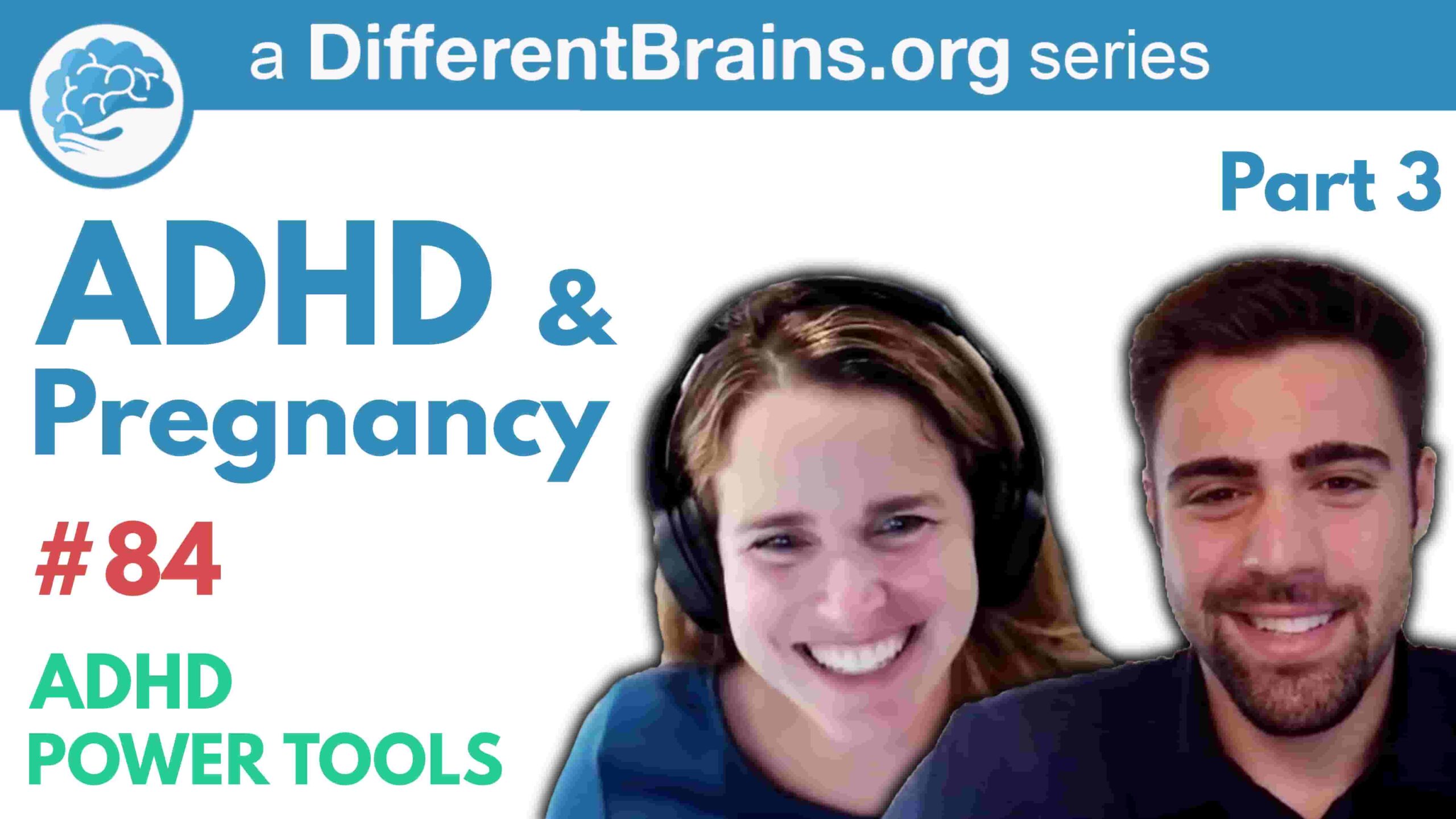
Employment for the Uniquely Abled, with Ivan Rosenberg | EDB 158
In this episode, Dr. Hackie Reitman speaks with Ivan Rosenberg, Founder and President of The Uniquely Abled Project.
(27 minutes) Ivan has extensive experience in the business world as well as working with the field of engineering and advocating for individuals with autism. He is the father of two sons with autism who are currently working in the field of engineering themselves. Ivan’s organization, The Uniquely Abled Project, seeks to shift perceptions in the business world from seeing people with different brains as “disabled” to seeing them as “uniquely abled” with special gifts, talents, and mindsets particularly suited for specific high-demand jobs in the workforce. The focus of The Uniquely Abled Project is to allow individuals with a diagnosis to have a meaningful career that provides income, dignity, and purpose while filling an essential need for employers. Join Hackie and Ivan as they discuss the 9 supports needed to assist the uniquely-abled find careers, the value to businesses in hiring those with different brains, and why the word “disabled” does job-seekers a disservice.
For more about Ivan and The Uniquely Abled Project: http://uniquelyabledproject.org/
To listen or download the podcast version of this episode, see the embedded player below.
Or look for us on your favorite podcast provider:
iTunes | Stitcher | SoundCloud
TRANSCRIPTION
[expand title=”View Full Transcript”]HACKIE REITMAN, M.D. (HR): Hi, I’m Dr. Hackie Reitman! Welcome to another episode of Exploring Different Brains, and today, we have the honor of having with us Ivan Rosenberg, who’s the founder of the uniquely abled project, and also the founder of so many other things we’re going to hear about. Ivan, welcome!
IVAN ROSENBERG (IR): Thank you! It’s a delight to be here.
The Uniquely Abled Project
HR: Well, thank you so much for being here. Now, why don’t you introduce yourself to our differentbrains.org audience properly.
IR: Well, I think the most important thing probably for your audience is that I am the father of two children on the autism spectrum, which is what got me interested in all this, in terms of what I’ve done professionally- I started off as an engineer which led some people to suspect that maybe, I’m somewhat on the spectrum myself, because I tend to like that kind of stuff. I graduated with an electrical engineering/computer science degrees, went to work for a while with that then got a PhD in business. Then, I was a professor for 5 years, then I consulted for many years and now what I primarily do is consult with aerospace and defense companies, primarily the manufacturers, which led me to have a big insight as to the kind of workforce that those companies needed. And that, combined with my knowledge of autism for my children, led really eventually to the uniquely abled project.
HR: Very interesting. Now, our mutual friend, Temple Grandin, has told me she gives commencement addresses around the country to various universities who are graduating engineering students, that she estimates that about half of engineering graduates are somewhere on the spectrum. what’s your guesstimate?
IR: Well, if you look at the characteristics of people that like engineering, it’s pretty black and white. The thing either works or doesn’t work. It doesn’t have a lot of the subtleties sometimes of dealing with human beings. It has nice rules associated with it, sometimes you can work alone; I know when I was teaching computer science, many of those students hated to work in teams. So I would say that I wouldn’t be surprised by that statistic.
Unemployment and the Skilled-Worker Gap
HR: Why don’t you give our audience some of the numbers last – you sent me in your excellent summary.
IR: If you look on the website of the government statistics about 17% of the US population is classified as disabled, and that includes all forms of disability, physical, mental, Etc. And the number 17% does not necessarily shock people, but when you multiply that times the US population you end up with 40 million people. That’s a lot of people, and more so when you look at the employment statistics: Theres 60- 90% of that 40 million are either underemployed or not employed at all, and by underemployed I mean somebody that is physically fit, that has a great many cases high IQ, and only has a little difficulty maybe with social interaction ending up bagging groceries at a grocery store; that’s underemployment. So that’s pretty shocking statistics and that again led to the work that I did with the uniquely abled project.
HR: Tell us about how it is did you do all that you’re doing which is so impressive, and you’re not providing direct services, explain that to our audience.
IR: Well the idea was to create something that would impact those 40 million people, and I do mean 40 billion; I’m not limiting to autism although that’s what we started. If you created an organization that serves a local population like somebody may create a company that specializes in janitorial services or fulfillment or something like that, and focuses on hiring folks in the autism spectrum for example. That’s great! But it’s not scalable, and if you’re going to impact 40 million people, you gotta create something that can be recreated across the country withhold not necessarily a lot of effort and to do that you got to provide value if somebody’s willing to pay for it. That is a sustainable solution. And in general you’re talking about a business solution you got to come up with a solution that solves the 90% percent unemployment among those with autism and the same time solve the problem for business. Well nice coincidence, the biggest problem that business has today is access to a skilled Workforce. There’s a very low unemployment rate, but there’s difficulty getting to people that can perform the tasks that businesses won’t want. So I said maybe these two problems are solutions for each other. So I started looking at what was in the way of businesses hiring people classified as disabled, and give him my business experience I got quickly realized it’s not a business decision to hire somebody who is disabled. You want to hire a business decision is to hire somebody who’s able to fill a need that you have as a business. That’s a business decision. Everything else is charity. And in fact that’s generally how we go to businesses today, is that we go and ask them to hire the handicapped, or be good community citizens. But that’s charity, and that’s not a sustainable solution. So the very word disabled gets in the way, and if one really looks at it it’s actually insulting, to be frank about it, as if all there is to say about a person is is it there missing certain capabilities, like there’s nothing else to them. Like here’s Joe and he’s blind like that’s all there is to Joe. As I said by two children both are on the Spectrum and they got pretty clear to me that that’s insulting, they don’t be called don’t want to be called disabled, they don’t want to be called anything quite frankly. Because that’s putting them in a box.
So I coined the term uniquely abled how to see things differently and next question was, “ ok, we now need to look at matching unique abilities to career jobs in demand.” So I’m not interested in helping people get jobs that are not in demand and I’m not interested in helping people get jobs that aren’t career jobs that are short-term part-time jobs they are pretty well handled already; there are structures out there which already do those jobs just fine. I’m interested matching people to Lifetime well paying career jobs. So there’s two kinds of jobs: There’s jobs that do not require prior training, these are typically relatively simple jobs that usually and highly repetitive and most businesses require that even though you do things repetitively you must maintain a high focus on detail, you can’t get sloppy about it, and that’s difficult for most of us; there are other kinds of jobs which are repetitive which may not require that. But these jobs in general do not require prior training; and then there’s the other kind of jobs that do require prior training, and they’re often involving operating machines, or things like that. These require two different solutions to match uniquely able folks to jobs in demand, so let’s take the jobs that do not require prior training first. The issue there is that the people whose job it is to find jobs for Unique abled folks generally most of their network is in retail businesses. So most of them come with social work background, not necessarily a business background and with the best of intentions, giving their life to going and taking care of uniquely able folks and helping them find a job, and not necessarily getting paid a lot for for doing that job. There’s nothing wrong with their motivation but their connections are mainly in retail because that’s what’s easiest to get to if you don’t know businesses. They don’t necessarily know how to network in business they don’t know how to find the vacancies in business So the first thing we had to deal with is training job Developers on getting a business Network of finding business vacancies, finding out how to talk to people in business, and when I say business I mean something different than retail so in the Parley instance of this tell story called b2c business selling to Consumers a B2B company is one that sells to other businesses. So for example a department store sells to Consumer that’s B2C Boeing sells to Airlines that’s a B2B company. it turns out that most of your career jobs well paying in demand career jobs are in B2B companies. The other thing we gotta deal with is the companies most companies don’t realize how many of these repetitive jobs that you have and they don’t realize that there’s a population which loves those jobs that’s really hard for most of us to understand cuz most of us would hate such a job and there’s a population which loves those kind of jobs. So the other project we’re involved is educating companies that they got a lot of repetitive jobs many of them not being done they have a high turn over in those jobs and that there’s a population that loves them and how to get in touch with the agencies that can provide those people.
The 9 Required Services
HR: I wanted to segway if you will list and explain the nine required services from the uniquely abled project point of view.
IR: So the first thing is, you’ve got to decide what diagnoses are you matching to what job. So what diagnosis has the unique abilities that match a particular job? So for example I started with high functioning autism and what’s called a CNC machine operator. CNC is a Computer Numerically Controlled machine it’s how huge amount of manufacturing is being done today and there’s a huge unmet demand for CNC operators. So that met my criteria, there’s a job in B2B, those are manufacturing firms it’s in demand it’s well-paying and it’s a perfect match for those with high functioning autism so that was a first step and then what you need to do is be able to select people for that particular job. They should have a diagnosis but that’s usually not sufficient you’ve got to make sure that they can exist inside the manufacturing environment that you’re talking about it could be noisy could be oily and dirty, it might involve working with other people or might working alone; there’s a number of characteristics one needs to pay attention to doing that match. the next thing- requirement was financial support. I’m a parent of two kids with autism. The programs despite government support are often very expensive and so there’s a program local program here which is very good it’s $30,000 a year for three years, most parents can’t afford that so I was determined from day one that the career education program that we set up did not require the parents to pay anything so financial support was really important.
Now it turns out that there’s a- many organizations particularly government organizations who are responsible for uniquely abled are very interested in a successful Employment Program because that fulfills their job what they’re up too and so what we created was uniquely able Academy which I will describe in a bit but the cost of that Academy is very very small compared to the cost of maintaining an individual as a client of that government agency, so our experience so far from government agencies has been this is wonderful for them foundations and other organizations who are very interested in supporting solutions that have people, uniquely abled people, get good employment, so financial support is a second requirement. The third requirement is you’ve got to have the technical skills training so you got to have someplace training people for example to be a CNC operator. We’ve been looking primarily at community colleges because at least in the Los Angeles area they recognize that is a need and have established CNC training programs because they have to have the machine, you have to have the instructors and so on, so generally we’ve been building called uniquely abled Academy around an existing technical skills program so you just sort of got to find that we’re not going to establish that. The next thing is you’ve got to train the instructors how to train this population for example, if you’re going to train folks with autism generally you want to lay out a roadmap generally you want to be very clear and specific, generally you want to give them multiple ways of learning material not just verbally, they often need to see it, feel it experience it, it’s apart of The Learning Experience. So we have to train the instructors how to train that population. we’ve been doing that it generally in a three-hour evening session it’s not that difficult but it needs to be done.
Then you need to have a job Readiness training so again for people with Autism that usually needs some kind of soft skills training, how to prepare a resume, how to do the interviews which are almost always required. How do you operate in a business environment, which many of them are not experienced, you have training to do that, and deal with such issues as you’re working at your machine, your intent a fellow worker comes up to you and wants to chit chat. how do you handle that in a way that doesn’t anger your coworker? You can’t just say, “I’m busy now, I can’t talk”. which would probably be the natural reaction of many people with a diagnosis. So we have to train them how to do that. so that gets them all the education part, so then you have to have the job search and placement so somebody has to go off and uncover the vacancies be able to talk to the businesses, be able to have them see we’re not trying to have them hire the handicapped we’re actually coming in with the offer of a valuable employee to fill a much needed vacancy that they have. They don’t need a vacancy they need someone to fill in the vacancy, so we’re really coming in as somebody with a solution to a problem the business person has but somebody’s got to do that, and generally our population doesn’t know how to do that.
So then you have to coach the potential employer how to select. the normal selection process for most businesses is to put them through an intense interview. Now for folks with autism, that’s usually a very traumatic experience and they don’t do well. Many people with many of your HR people, don’t know anything about autism, so the normal behavior of somebody with autism, they may misinterpret. for example they may ask the person a question, and in asking that question, answering that question, person with autism might not look in their eyes and I looks like what I’m doing right now looking directly at him because it’s usually too intense for a person with autism. An HR person may interpret that as their lying and failed to get the job. So we’ve got a train employers how to select and generally we suggest they not go through an intensive HR interview unless the HR people have been educated a little bit close as to what to look for and again that’s not necessarily a big deal but it has to be done. so eighth, we need to coach the employers how to onboard and to manage. Now again that doesn’t turn out to be a big deal, the existing uniquely able folk’s that we’ve placed both in terms of those without prior training and those with; they went through the standard on-boarding process that the company had, what was different is there was almost always not always a job coach present, so the job coach could help explain and answer some of the questions related to the on-boarding, and that was very useful in that part and then the last thing, the ninth thing you need, is post hire support, and that varies all over the block with the individual in general again for the population we’ve been dealing with, there is more support needed at the beginning during the transition because people with Autism often hate transitions deal with the difficulties they need support, but generally in all the cases we’ve seen the job coach fades out and in less than a year and it varies from Individual to individual, but generally in less than a year, they’ll be six to nine months often, the job coach is either not present at all or maybe comes by one hour a week or one hour every other week, it’s not a big deal so far. So those are the nine functions.
There’s no one organization that provides all those functions. For every one of those functions, I can point to at least one organization that does it, but nobody provides it all, and therefore there’s no single program that provides all those functions and therefore we have a real lack of Career Education facilities for the uniquely abled, so we created a structure called the uniquely abled Academy and that’s all it is it’s not a legal entity, it’s a structure in which organizations can collaborate to provide all nine functions, again we’re calling that a uniquely abled Academy and we’ve got two academies running now we have another seven in planning for this year, and we have 100% placement in those that have graduated, and they are doing extraordinarily well that’s the structure of a uniquely abled Academy it takes about six to nine months to establish an academy around an existing skills training facility, and there’s a -we’ve written a manual on how to do that, and generally that starts with a small meeting at the educational facility, they decide how those nine functions are going to be provided what organizations are going to be invited, and those organizations get invited to initial formation project team meeting and then from then on they generally meet monthly, and it takes as I said about six to nine months to the first class we have two uniquely abled academies for CNC operator training in existence. They have graduated thirty-seven folks between them and we have 100% placement. think about these thirty-seven folks and I’m not even about the folks now that have got jobs that do not require prior training but the same experience they all of a sudden are the best at what they’re doing and that’s really hard to get; some of the employers have said one said for example after 2 and 1/2 Weeks he’s equal to or better than the best CNC operator I’ve ever had, and by the way I should tell you that the uniquely abled Academy program on CNC operators take 16 weeks so we’re not talking about 3-year program but that’s because are so naturally matched to CNC operator, it’s really easy. So and in other cases one HR Director said they’ll learn in weeks what other people take months to learn, and in places they give them raises before they normally would so it’s very very successful it’s not just finding a job, but finding a job that you can excel at, that is good paying because it’s in demand and it gives you a career and there’s lots of career steps one can take from being a CNC operator.
To learn more
HR: How can our audience learn more about the uniquely abled project and how can people get involved with the uniquely abled project?
IR: Ok. So how they can learn more is really two ways: one they can go on our website with uniquelyabledproject.org pretty easy and there’s a huge amount of information on there including a number of videos which do a good job of explaining and showing the process. The other thing they can do if they want to learn more is to subscribe to the newsletter which comes out quarterly and that keeps people posted on what’s going on and you can do that again through the website. if you’re a organization that provides job placement capabilities and services then you may want to conduct- have us conduct a job developer workshop in your area. It’s generally a one day workshop, it’s not that expensive and we generally want to have somewhere between 15 and 20 people in the workshop and they almost never come from the same organization, so we have one in the area and homeless people get invited to it, so if you’re interested in that, contact us through the uniquely abled Academy excuse me, the uniquely abled project website. you may also be interested in the uniquely abled Academy whether your a parent or a business or an educational facility or government facility, you can get one started, and all you have to do there again is to contact me through the website or through my email address it’s irosenberg@uniquelyabledproject.org that’s all you have to do and we’ll get you started and like I’ve said, you don’t have to know anything except you wanted to do this because like I said we had a parent in Massachusetts all she knew was she had a son in his early twenties and she thought this would be a great program for him, and I coached her by phone. I’ve never been the visit her, and they’re now looking for an instructor, they have everything set up to go and once they find that instructor she will have an operating uniquely able Academy and CNC operator training in the Boston area, So it can be done.
HR: Ivan, it’s been a pleasure to have you here at differentbrains.org, keep up the great work you’re doing at the uniquely abled project, and we hope you’ll be back soon.
IR: I will! I will be delighted to be back, and thank you for all you’re doing for the uniquely abled population.
[/expand]



